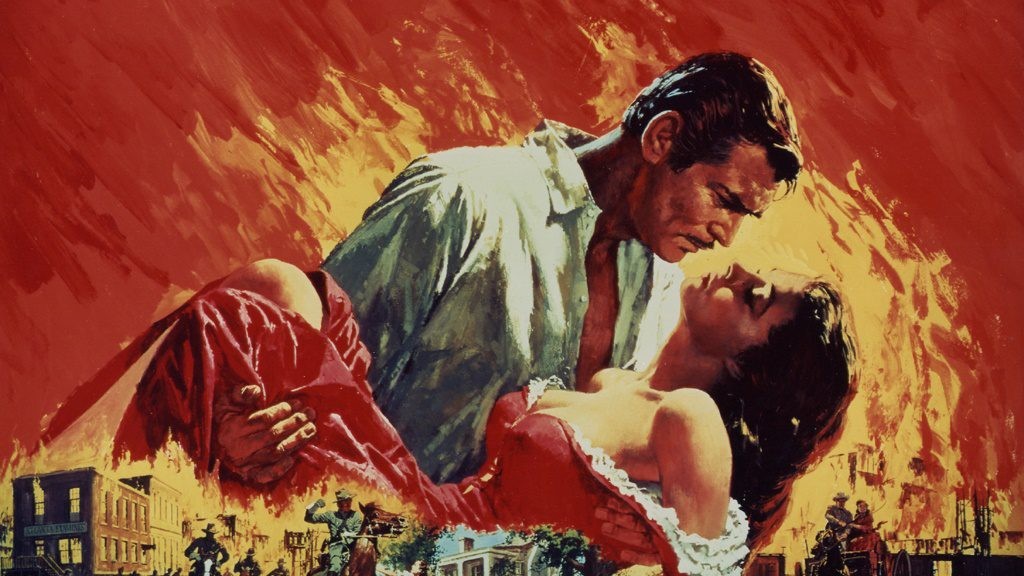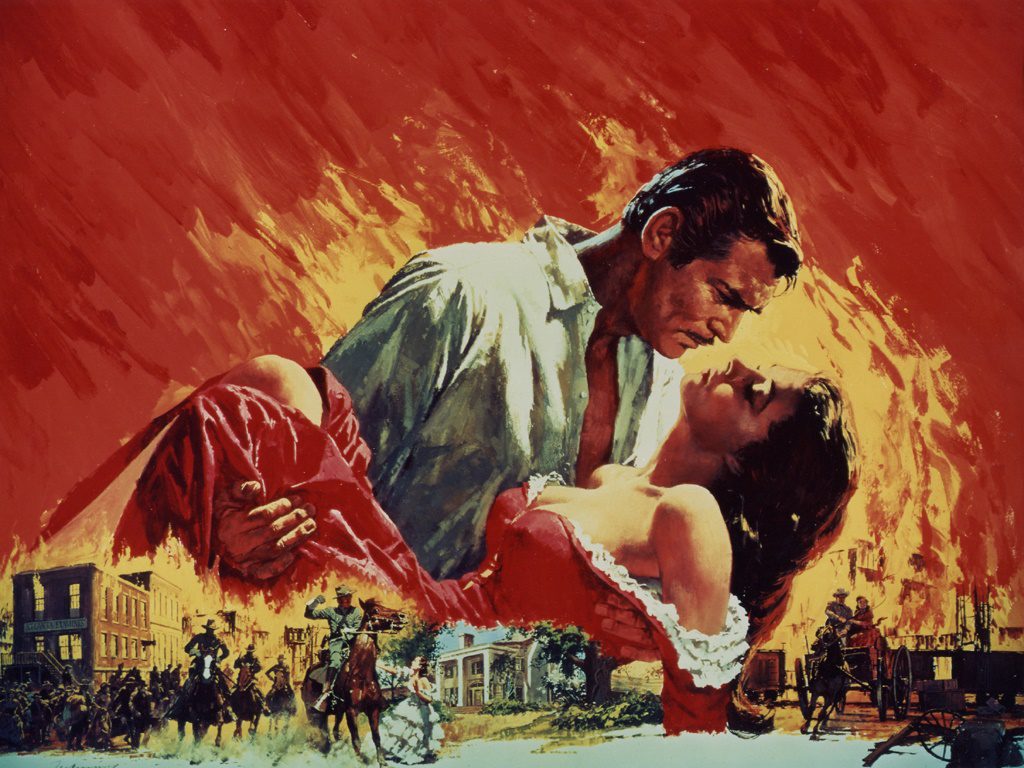The TCM Classic Film Festival is a haven for movie lovers to watch timeless films on the big screen, the way they were meant to be seen. Whether you’ve seen a film once, twice, or not at all, watching a classic film in a theater with fellow cinephiles is a heartwarming experience. This year, we’re discussing Sgt. York, Day For Night, Goodbye Mr. Chips, Gone With The Wind, Kind Hearts and Coronets, and Marty (for a behind-the-scenes look at this year’s festival, click here).
Sgt. York
A Best Picture nominee in 1941, Sgt. York was released weeks before Pearl Harbor shocked Americans to the core and proved to be the perfect picture for wartime inspiration. The titular Sergeant, played by Gary Cooper, starts out as a country bumpkin from Tennessee whose only pastimes are drinking and shooting guns. We watch a character transformation as York finds his way to religion first, then a love of country brought on by The Great War, and a call to arms he must participate in. It harkens back to a time where patriotism had a much different meaning and Americans were realizing just how much their country as a whole meant to them. It’s definitely a worthwhile watch for a socio-political perspective, and a fairly compelling look at an unexpected hero and how he came to be such.
This TCM screening was made extra special by being the inaugural screening at a brand new movie theater: The Legion Theater at Post 43, a military club on Highland Avenue with a spectacular new theater. In person was both the son and grandson of Sgt. York, who have both served in the military themselves and actively participate in sharing their father’s legacy.
Day for Night
This 70s French movie about the making of a movie has gone on to influence dozens of similar films, both sprawling ensemble pictures as well as stories about the motion picture industry behind the scenes. If I say that it’s a movie about making movies, you can almost picture it all. Seeing Nashville in the same festival, it’s clear even Altman, the master of the ensemble, emulated similar story components that Truffaut established. Tropes I’ve seen countless times all seem to originate here: the actress who forgets her lines, the expensive sequence with a disastrous camera error, and of course lots of love affairs and passionate secrets. This movie may not have resonated with me as much given how many similar movies I’ve seen, but is nonetheless a pioneering film infused with some great French culture that affirms its place as a classic.
Goodbye Mr. Chips
This unabashedly sentimental film is a favorite of my dear grandma, and so I owed it to her to finally check it out at this year’s TCM festival. The titular Mr. Chips (Robert Donat in an Oscar-winning role) is an aging teacher at a boys prep academy who has been at the school so long he is its heart and soul. Generations of teaching schoolboys have made him wise and more than a tad eccentric and we see how he became such a staple of the school through flashbacks.
Goodbye Mr. Chips is comedic, tragic, and altogether heart-warming motion picture. In the film’s introduction, the speaker said to the packed audience, “you either had a Mr. Chips in your life, or you didn’t.” I was fortunate to have a few “Chips” in my formative years and suffice to say, the film is definitely a touching reminder of the great educators who helped us along the way.

Gone with the Wind
At all times, we film lovers have one movie that people are most shocked we haven’t seen. For years, that movie for me probably has been Gone With the Wind. I’m certainly glad I waited to see it: this meant I could view it on the 25th anniversary of TCM Channel, at the Chinese theater, on a spectacular print that looks as spotless as if it were made yesterday, despite being a film made 80 years ago. Sometimes, movies are worth waiting for the right opportunity to check out.
Unfortunately, the aesthetics are where my praise of this acclaimed film ends. While I knew the film took place in the South during the Civil War, I had no idea to what extent it is a shameless romanticization of the “Old South” described as a beautiful land of prosperity. From the saccharine prologue text, all the way up until intermission, it seems like every moment wants to infuse nostalgia for the era and the lifestyle of the affluent plantation owners who serve as the protagonists. (The second half is less epic but substantially less problematic). Slavery is not ignored, far worse: it is presented as a way of life with harmony and prosperity. Countless times I found myself in utter shock with the perspective through which the film repurposes American history to its own unsettling opinion, enough to warrant a direct comparison to The Birth of a Nation. Yet for some reason, the two films have aged far differently from film historians.
Ultimately there is much more to say about this film than a short review will allow for. My short takeaway is that from a modern day viewer, celebrations of this movie may need a second look. TCM Classic Film Festival hosted a conversation about the controversies associated with the film’s ornate legacy: I wish I had been able to see and hear this talk and am still hoping someone recorded it and will post online. I hold many classics near and dear to my heart. This will not be one of them. Nonetheless, I am grateful for the breadth of movies that TCM has given access to and believe that all movies, no matter how unpleasant, deserve to be made available for viewing and study.
Kind Hearts and Coronets
While today’s audiences may know Sir Alec Guinness best for his role as Obi-Wan Kenobi, in the mid-20th century he was a star known for his zany comedy, the likes of which included The Ladykillers, The Man in the White Suit, and this film- Kind Hearts and Coronets. The draw here is that Guinness plays 6 different roles (8 depending on how you count), each a snobbish heir to a vast fortune, and a target for murder by a cunning heir further down in the lineage. What we’re seeing is the initial seeds of what would become a staple of comedy: the multi-character routine seen here appears to be a major inspiration for Eddie Murphy and Mike Myers, among others. The film’s darkly funny plot seems to have influenced Sunset Blvd (which came out the next year) and many other comedies that deal with murder, money, and family.
In person to introduce the film was Jefferson Mays (The Ballad of Buster Scruggs, Inherent Vice), who performed the same set of 6+ roles on stage and described the countless costume changes that sometimes were only 10 seconds long! This is a fun movie and I’m sure seeing a stage version would be equally entertaining.
Marty
The Best Picture winner from 1955 has been earmarked by me for a while given the superlative that at just 90 minutes, it is the shortest movie ever to win the top Oscar. Contextualizing it further, in the same era that grandiose movies like Around the World in 80 Days and Ben-Hur were being celebrated by the Academy, it makes it all the more incredible that Marty, a slice of life comedy, could take home the gold.
Before it started, the woman sitting next to me asked if I had seen it before – when I said I hadn’t, she smiled and said: “Oh, you are in for a treat.” And she was right: I grinned from ear to ear for the entire duration as we follow Marty (Ernest Borgnine, in an Oscar-winning performance), a down-on-his-luck bachelor whose entire community won’t leave him alone about the fact that he’s not married. Many classic movies require a reframing, as certain elements are hard to view in today’s light. Marty requires no such thinking – the story is timeless and resonates as deeply today as it would’ve upon release. For me, this is the true definition of a classic, a new all-time favorite, and a movie that will stand the test of time for generations to come.
H. Nelson Tracey
Nelson is a film director and editor from Denver based in Los Angeles. In addition to writing for Cinemacy, he has worked on multiple high profile documentaries and curates the YouTube channel "Hint of Film." You can check out more of his work at his website, hnelsontracey.com







